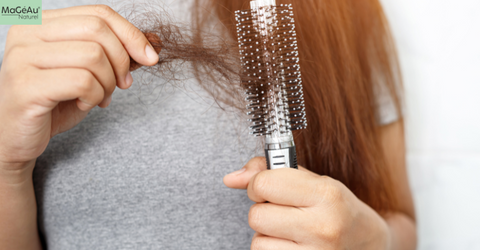Nous vivons dans un monde où la commodité prime souvent sur la santé. De nombreux produits que nous utilisons au quotidien, des soins de la peau aux emballages alimentaires, contiennent des substances chimiques cachées qui peuvent perturber notre système hormonal.
Ces substances chimiques, appelées perturbateurs endocriniens, sont présentes partout. Même si leurs effets ne sont pas ressentis immédiatement, ils peuvent, au fil du temps, entraîner de graves problèmes de santé.
Alors, que sont exactement les perturbateurs endocriniens et pourquoi devriez-vous vous en soucier ? Analysons tout cela.
Que sont les perturbateurs endocriniens ?
Les perturbateurs endocriniens sont des produits chimiques qui interfèrent avec votre système endocrinien, le système responsable de la production et de la régulation des hormones dans votre corps.
Les hormones jouent un rôle essentiel dans presque toutes les fonctions de votre corps, du métabolisme à l’humeur en passant par la reproduction.
Lorsque les perturbateurs endocriniens pénètrent dans votre système, ils peuvent imiter, bloquer ou modifier vos hormones naturelles, entraînant des déséquilibres.
Ces perturbations ont été liées à divers problèmes de santé, notamment :
- Infertilité et problèmes de reproduction
- Troubles de la thyroïde
- Prise de poids ou difficulté à perdre du poids
- Risque accru de certains cancers
- Problèmes de développement chez les enfants
Les coupables sournois qui se cachent dans votre routine quotidienne
Vous pourriez penser : « Je ne suis certainement pas exposé à ces produits chimiques tous les jours. » Malheureusement, la réalité est que de nombreux produits courants que vous utilisez peuvent être des sources de perturbateurs endocriniens. Voici quelques-uns des contrevenants les moins connus :
1. Parfums dans les produits de soins personnels
Vous aimez utiliser des parfums, des lotions parfumées ou des gels douche ? Beaucoup de ces produits contiennent des parfums synthétiques , qui cachent souvent des phtalates. Les phtalates sont des produits chimiques qui prolongent la durée de vie des parfums, mais ils sont également connus pour être des perturbateurs endocriniens.
Le problème : les phtalates peuvent imiter des hormones comme l’œstrogène, ce qui peut entraîner des déséquilibres hormonaux, des problèmes de reproduction et même une puberté précoce chez les enfants.
Que faire : Recherchez des produits étiquetés « sans parfum » ou ceux qui utilisent des huiles essentielles naturelles pour parfumer. Vérifiez les listes d'ingrédients pour des termes tels que « phtalates » ou « parfum ».
2. Ustensiles de cuisine antiadhésifs
Les poêles antiadhésives facilitent la cuisson et le nettoyage, mais le revêtement contient souvent des substances per- et polyfluoroalkylées (PFAS), également appelées « produits chimiques éternels ».
Le problème : les PFAS peuvent s’accumuler dans votre corps au fil du temps et perturber la fonction thyroïdienne, le métabolisme et même votre système immunitaire.
Que faire : Optez pour des ustensiles de cuisine en acier inoxydable, en fonte ou en céramique. Ces options sont plus sûres et tout aussi efficaces une fois que vous les maîtrisez.
3. Récipients alimentaires en plastique
Le plastique est pratique, mais de nombreux récipients en plastique libèrent du bisphénol A (BPA) et des produits chimiques similaires dans vos aliments, en particulier lorsqu’ils sont chauffés.
Le problème : le BPA imite l’œstrogène et a été associé à l’infertilité, à l’obésité et même aux maladies cardiaques.
Que faire : Optez pour des récipients en verre ou en acier inoxydable pour conserver vos aliments. Ne faites jamais cuire au micro-ondes des aliments dans du plastique, même si l'étiquette indique « adapté au micro-ondes ».
4. Aliments en conserve
La doublure de nombreux aliments en conserve contient du BPA ou des produits chimiques similaires, qui peuvent s’infiltrer dans les aliments que vous mangez.
Le problème : Tout comme les contenants en plastique, le BPA contenu dans les canettes peut perturber votre équilibre hormonal.
Que faire : Recherchez des boîtes de conserve étiquetées « sans BPA » ou choisissez des aliments frais ou surgelés plutôt que des aliments en conserve.
5. Nettoyants ménagers
De nombreux produits de nettoyage contiennent des produits chimiques agressifs qui sont absorbés par la peau ou inhalés sous forme de vapeurs. Parmi ces produits, on trouve des alkylphénols et d'autres perturbateurs.
Le problème : ces produits chimiques peuvent interférer avec votre système endocrinien et potentiellement affecter la fertilité, l’immunité et la régulation hormonale.
Que faire : Passez à des nettoyants naturels ou faits maison fabriqués à partir d’ingrédients comme le vinaigre, le bicarbonate de soude et les huiles essentielles.
6. Reçus
Saviez-vous que le papier thermique utilisé pour les reçus est enduit de BPA ? Chaque fois que vous manipulez un reçu, de petites quantités de BPA peuvent se transférer sur votre peau.
Le problème : une exposition fréquente au BPA via les reçus peut augmenter la charge chimique de votre corps, perturbant ainsi votre système hormonal au fil du temps.
Que faire : refusez les reçus lorsque cela est possible ou manipulez-les le moins possible. Lavez-vous les mains après avoir touché les reçus, surtout avant de manger.
7. Crèmes solaires
Certains écrans solaires chimiques contiennent de l’oxybenzone, un perturbateur endocrinien connu.
Le problème : l’oxybenzone peut imiter l’œstrogène et a été associée à des cancers liés aux hormones.
Conseils d'utilisation : utilisez des crèmes solaires à base de minéraux contenant de l'oxyde de zinc ou du dioxyde de titane. Ces produits sont plus sûrs pour votre corps et pour l'environnement.
Pourquoi ces produits chimiques ne sont-ils pas interdits ?
Vous vous demandez peut-être pourquoi ces substances nocives sont encore autorisées dans les produits. En réalité, la réglementation sur ces produits chimiques varie considérablement d'un pays à l'autre. Dans certains pays, comme l'Union européenne, des règles plus strictes limitent leur utilisation. Mais dans d'autres, comme les États-Unis, nombre de ces substances sont encore considérées comme « sûres » en petites quantités, malgré les preuves de plus en plus nombreuses de leurs effets à long terme.
Comment vous protéger et protéger votre famille
La bonne nouvelle est que vous pouvez prendre des mesures pour réduire votre exposition aux perturbateurs endocriniens. Bien qu'il soit presque impossible de les éliminer complètement, de petits changements peuvent avoir un impact important au fil du temps.
Voici quelques conseils :
- Lisez attentivement les étiquettes. Évitez les produits dont la liste d'ingrédients est longue et méconnaissable.
- Choisissez des alternatives naturelles. Des produits de soin de la peau aux produits de nettoyage, il existe aujourd'hui de nombreuses options plus sûres. Choisissezdes produits de soin de la peau 100 % naturels .
- Réduisez votre consommation de plastique . Investissez dans des alternatives réutilisables et sans plastique pour le stockage des aliments et des bouteilles.
- Aérez votre maison . Ouvrez régulièrement les fenêtres pour réduire l’accumulation de polluants dans l’air intérieur.
- Soutenir la réglementation . Plaider en faveur de lois plus strictes sur les produits chimiques nocifs en soutenant les organisations et les politiques qui donnent la priorité à la santé publique.
Libérez-vous : réduire l'exposition quotidienne aux perturbateurs endocriniens courants
Les perturbateurs endocriniens sont peut-être invisibles, mais leurs effets sur votre santé sont bien réels. En comprenant où se cachent ces substances chimiques et en faisant des choix conscients, vous pouvez vous protéger, vous et vos proches, de leurs effets nocifs. N'oubliez pas que les petits changements s'additionnent. Commencez par un ou deux ajustements dès aujourd'hui et vous serez sur la voie d'un mode de vie plus sain et plus propre.





Commentaires (0)
Il n'y a pas de commentaires pour cet article. Soyez le premier à laisser un message !